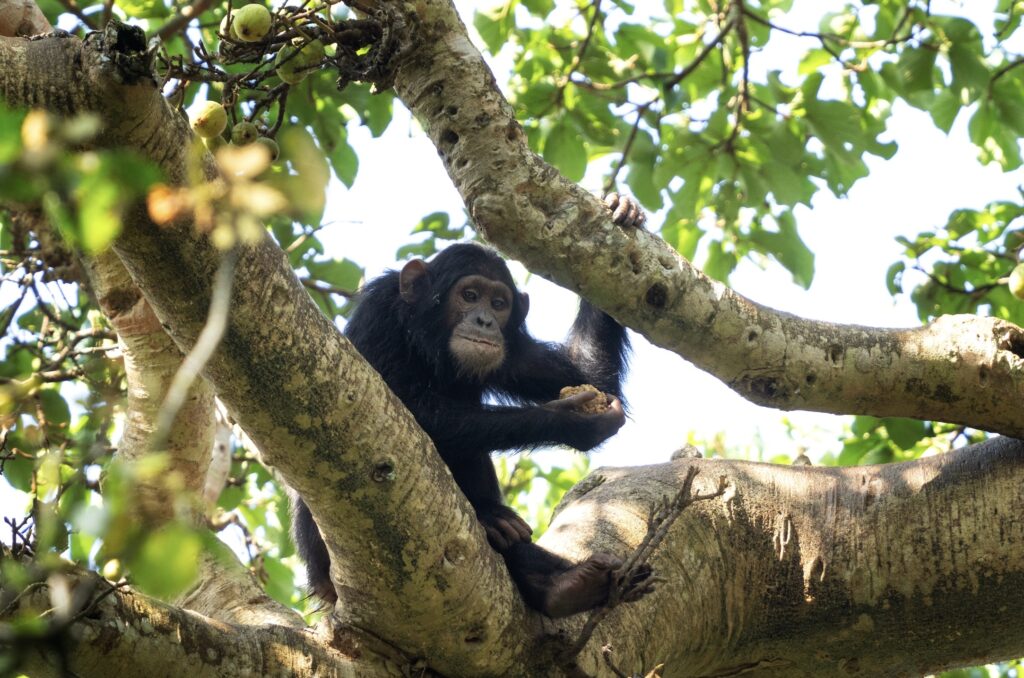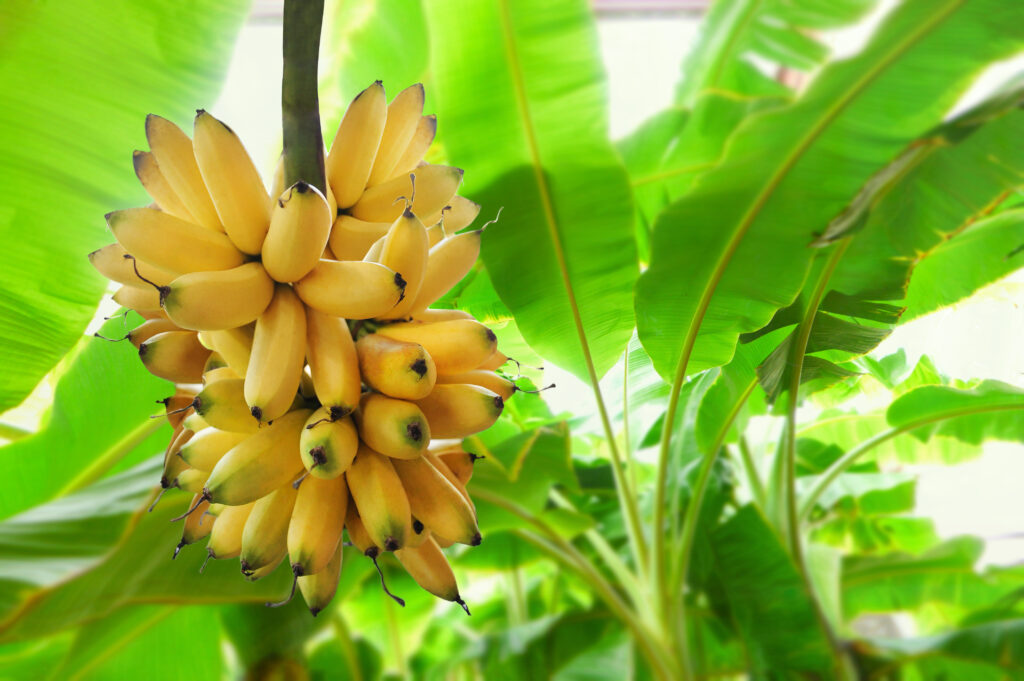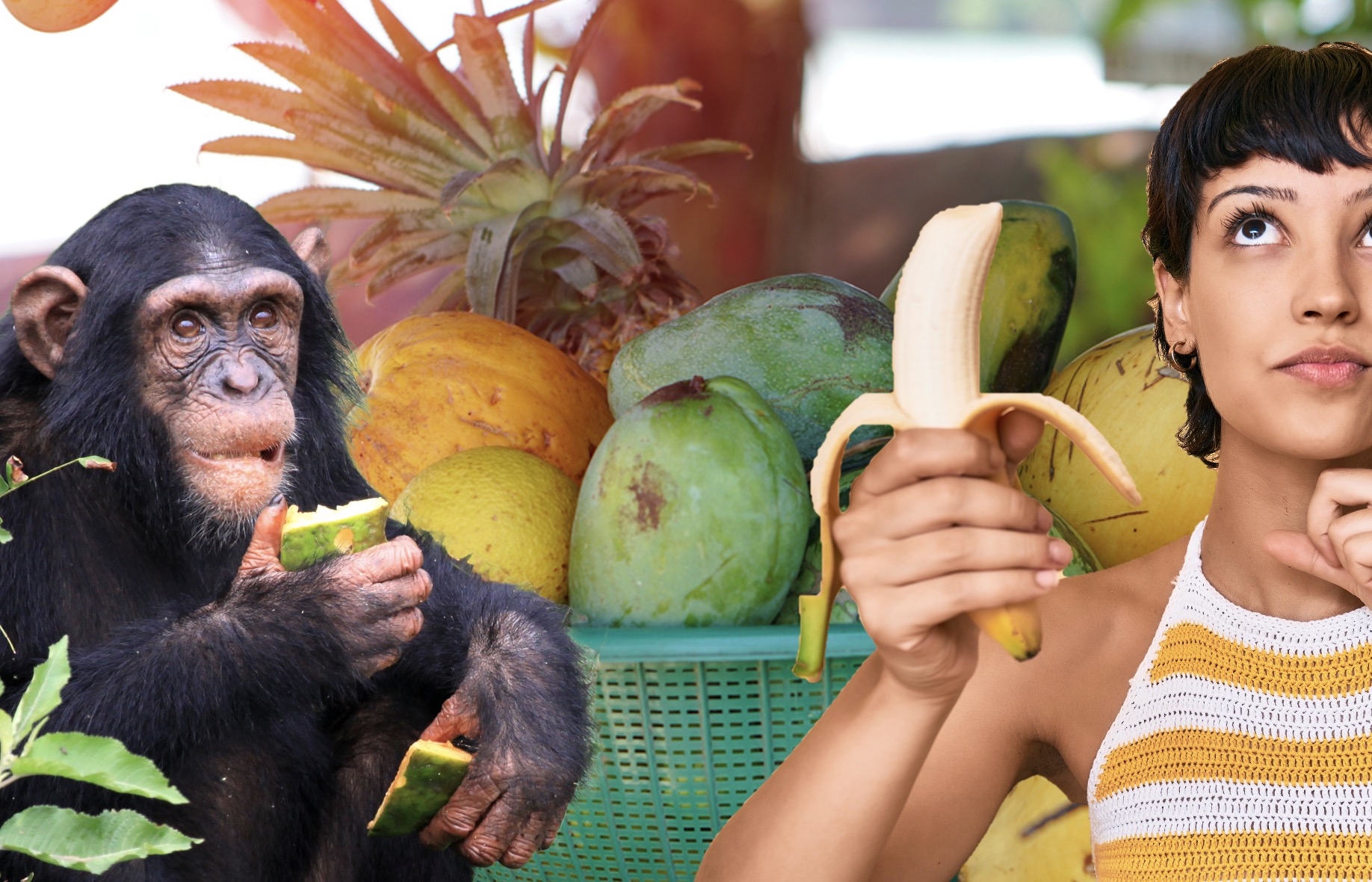A fruit-based diet is truly special! It’s unique in its concept because it is based on our biological traits as frugivores and the diet we can observe in our closest living relatives – chimpanzees. All apes are specialized in fruit-eating! A fruit-based diet is, thus, the species-specific diet of humans. Tropical fruit and our ancestors shared a (symbiotic) evolutionary history, which led to a perfect nutritional match. If we take a close enough look, we will find that our cooked, culturally developed diets (which humans invented to survive outside their natural habitat) actually copy our natural diet nutritionally and flavor-wise. We all love the colors and taste of ripe fruit and our instincts tell us that fruit is appealing and suitable as a food – raw from nature!
If you have come so far to consider and try a fruit-based diet, you are one of the lucky souls who know about our frugivorous nature! But… before you start a fruit diet, know what a fruit diet is and what to consider for a successful and sustainable frugivore diet – to avoid running into deficiencies. The critical voices raised against frugivorous diets are justified – if we do not do this right!
So before you start, you need to know the basics of our frugivore biology to keep your motivation for a fruit diet high. And to do it the healthy way, preventing common mistakes and deficiencies.
Also, check out our guide to understand more about the frugivore diet.
Why a raw fruit-based diet?
Everything animals eat in the wild is in its raw state. Therefore, a raw diet is not extreme – it’s natural! Cooking was (and still is) a survival strategy of humans when living in areas without abundant tropical fruits and food sources. Further, we do not have physiological adaptations that hook us to a cooked diet! Hence, our species-appropriate diet is raw, like the diet of any other species!
A raw diet is known to induce enhanced detoxification with transformative health benefits. And, on the quest to find the natural human diet, we now re-discover that humans are biologically specialized in eating ripe fruits:
We are specialized in fruit-eating
Our anatomy and physiology are remarkably similar to that of other great apes, including the adaptations for fruit-eating. All apes are highly frugivorous! Frugivores are a subtype of omnivores (or sometimes herbivores) that preferably and mainly eat ripe fruits.

Humans are a tropical species living in the wrong biome – eating survival foods
As a species, humans originated in the tropics, but many of us live in cold climates, outside our natural habitat and alienated from nature. As a result, we lack easy access to the main food sources we have evolved with – tropical fruits, nuts, and greens. The migration out of the tropics is why our ancestors have turned to cooked survival foods, which are sub-optimal, non-species-specific foods.

Finding the way back to our natural diet
Luckily, every crisis is an opportunity: re-discovering our natural diet and the benefits coming with it can feel like magic. Fruit diets have resulted in incredible body transformations and regeneration in many people in the growing “fruit diet community.” Therefore – despite all obstacles and doubts – it is worth giving it a shot! You can adopt a frugivorous diet in the long term under good conditions (access to high-quality tropical fruits and foods) or for shorter periods, to improve your health.

What is a frugivore diet in nature?
A frugivorous diet describes the foods foraged by frugivorous animals in nature, which consists mainly of fruits. For frugivorous primates, this means mostly ripe tropical fruits, some greens, nuts, and tubers, but also a small amount of insects and, in some cases, eggs or meat. Frugivorous primates can only exist in the tropics, where fruits are larger, more nutritious, and abundant throughout the year. An average chimpanzee’s diet, for example, looks like this:
Overview of a chimpanzee’s diet
This is an average diet. In nature the diets vary, depending on food availability.
70% tropical fruits and figs
24% other plant-based foods (greens, flowers, nuts, seeds, barks, tubers), of which up to 20% are tender leaves
6% animal-based (eggs, insects, and meat), of which 4% are insects and 1-2% meat

Diets of frugivorous animals are all fruit-based but vary among species and even populations or within populations depending on food availability. For example, chimpanzees can have periods of time when they eat only fruits. On the other hand, the generally frugivorous primates – macaques, chimpanzees, and capuchins – in Thailand are known to eat shellfish. They use tools, a specialized behavior, in which the capuchin monkey seems to apply their shell-cracking skills on shellfish, which they already know from the handling of their favorite hard-husked palm-tree fruit called Cumare. Frugivorous chimpanzees even hunt smaller monkeys. However, there are strong indications that hunting is not a nutritional requirement (not all chimpanzees eat meat) but rather a socially motivated behavior among males.
Thus, translating what we observe in nature into the human frugivore diet is also based on our natural instincts:
What does a frugivore diet look like in humans?
The frugivore diet of humans consists mainly of tropical fruits, nuts, greens, and tubers. Check out our guide to know more about the specifics. However, there is no “standard” fruit-based diet because it is a natural concept and thus underlies variety.
In practice, there are different approaches, such as a frugivorous diet, fruitarian, high-fruit raw vegan, or fruit detox, which are similar but not the same. Our approach here is to study and apply the biological diet of frugivores combined with human instincts. But most principles we discuss can be used for other types of diets, too. Why is frugivore the approach of choice here? It’s a fully natural concept and not based on dogmas or beliefs but on what we can observe in the wild.
Read also our article on the different concepts in fruit-based diets: Fruit-based Diets: What Is Frugivore and Fruitarian?
A fruit-based diet is nothing new – it’s natural!
The benefits of high-fruit diets are nothing new in ancient human knowledge! For example, fruit “fasting” is known to boost the self-regeneration of the human body in Indian tradition.
However, because there are pro and contra arguments for almost everything in science, there is a labyrinth of nutritional information that confuses people! Here is where biology jumps in as a handy tool! Biology does not lie about dietary features and, hence, is the most reliable compass within the jungle of diets! And here comes a well-kept secret that our morphology and physiology reveal if you are open-minded to new inputs:
Human dietary biology resembles that of our closest living relatives, the chimpanzees! Let this sink in for a moment: Human biology is most similar to that of tropical frugivores (see above)! Therefore, our species-appropriate diet is based on tropical fruits.
Isn’t a balanced diet our natural diet?
Humans have evolved cultural adaptations, enabling them to transcend the limitations imposed by their biology. However, residing in less-than-ideal environments takes a toll on health. Typically, humans are raised in specific cultures and local environments, learning to prepare and consume local cuisine without often questioning the nature of their food. Consequently, many people consume diets that aren’t ideally suited to human biology. We frequently eat foods that aren’t naturally edible in their raw form, and some of these foods are even toxic unless cooked correctly. In fact we have no adaptations that hook us on cooked foods!
The idea of a “balanced diet” is essentially an effort to consume a diet that optimizes survival, rather than one that’s naturally suited to humans. Since we don’t live in our original habitats, a balanced diet becomes necessary for our existence. It helps us obtain necessary nutrients while managing harmful anti-nutrients, trying to mimic our evolutionary diet as closely as possible. Nonetheless, these foods are still not what we’re evolutionarily adapted to consume, and therefore, they may not be ideal for our health.
Ditch high-protein! High-carb diets turn out to be the healthiest!
The human diet and the diets of all apes in the wild are highly fruit-based. Nonetheless, it takes courage to voyage into a raw high-fruit diet – because we live in times when sugar is mistaken for a toxin, and everyone calls your raw, natural diet “extreme” while sipping on their highly processed protein shakes, thinking it’s healthy…
This doesn’t mean that a frugivorous diet does not contain a sufficient amount of protein. To address the “protein deficiency concern”, we carefully calculated the protein content of fruit-based diets here!
Have no fear of natural, raw, sweet high-carb foods (fruits)
A high-carb diet is healthy when we keep it natural by eating high-quality, fresh, raw foods! The human metabolism depends on sugars as the primary source of energy – our cell’s fuel. Simple sugars are the most readily available energetic macro-nutrients for our metabolic processes.
But, why should we focus on a high-carb, fruit-based diet in times of high-protein diets, raw-meat-eating being a thing, and over ten years of witch-hunting simple carbs (even from fruits)? Because it is more crucial than ever to know what the natural human diet is, in these times of fabricated new fad diets! After all, we do have a species-appropriate diet, just like any other species! A fruit-based way of eating is not a random new diet, it is choosing foods according to human frugivorous biology.
Simple carbs do not deserve a bad rep: From a biological perspective, the human organism, like that of all primates, is adapted to obtain energy from simple carbs from fruits. Simple sugars from natural sources are the optimal energy carrier for our cells. Glucose (and in many types of cells also fructose) is needed for vital functions in our cells and body (read more here).

In nutritional sciences, it is well-understood that too much protein has various damaging effects on human health. On the other hand, studies that fruits are not only beneficial but essential for health are mounting. Therefore, hopefully, the days of protein shakes may soon be counted. Don’t get that wrong though: Getting enough protein from diet is critical, but we need much less than most of us think, as Stanford’s Professor Christopher Gardner explains in a video interview.
There is hope that the current hype around high-protein diets is calming down and that the war on carbs might be history soon. The scientific community is finally rediscovering the benefits of high-carb diets. The important role of tropical fruits in human health is slowly becoming a topic in the scientific community, too! In particular, tropical countries are starting to investigate their fruits and discover the nutritional and medicinal benefits known in traditional well-being practices. Find one example here. But also in sports nutrition, the power of tropical fruits is known for performance and regeneration.
Benefits of a fruit diet
The benefits of a fruit diet are often described as energizing, detoxifying, rejuvenating, anti-inflammatory, and boosting self-regeneration.
Those benefits are based on the same principle: maximize nutrition (“the good”) for the body and minimize the toxic burden (“the bad”). When we stick to our species-specific diet – a frugivorous diet – we do exactly that! Inflammation is caused by the immune system signaling and works to eliminate infections and toxins. Regeneration and cellular renewal can only occur when the organism has the strength and resources to eliminate accumulated waste. It is all about the question: are you eliminating or accumulating waste and toxins?
The most common physical and mental benefits experienced on a fruit diet are:
- More energy
- Healthier skin
- Clear mind
- Positive thoughts
- Decreased inflammatory processes
- Subsiding autoimmune processes
- Regenerative instead of degenerative condition
- Activated cleansing processes
This list is nowhere near complete! People have improved (reversed) countless conditions on a fruit-based and raw diet because this approach allows the body to accelerate its natural default “self-repair mode” rather than keep the inflammation and waste accumulation out of hand.
Because of the lack of scientific studies on raw fruit-based diets (tropical fruits-based), there is nothing to back this up – or to defy it. Raw diets are – more often than not – done wrong because they are not based on tropical fruits (the pillar food of our natural diet), which leads to deficiencies and undernourishment. Tropical fruits are unique in their nutritional profile and content and cannot be compared to temperate fruits or other raw foods.
About one area, luckily, we find an abundance of scientific evidence – the benefits of tropical fruits! Here is our growing list of “superfruits”:
- Açai
- Acerola
- Avocado
- Bananas
- Breadfruit
- Mangosteen
- Custard Apple
- Guava
- Durian
- Tropical Figs
- Rambutan
- Lychee
- Dragonfruit
- Papaya
- Mango
- Passionfruit
- Granadilla
- Soursop
- Starfruit
Risks of a fruit diet
Unfortunately, you need to consider some nutritional shortcomings, even on the human species-appropriate fruit diet. Why? Because most of us don’t live in areas with tropical forests (our natural habitat). We do not have access to wild, nutrient-dense fruits (or other foods) from healthy soils and enjoy the environmental conditions that do provide everything we need. Humans surely have a species-specific diet, but, more often than not, we lack access to our natural habitat and, thus, natural foods. This is why we have survival foods, cooked foods, since the Paleolithic era, due to migrating into non-tropical biomes. Today, we can access many more types of foods, even if we live in remote areas. However, the quality and amount are not the same as living in the tropics.
Because of our alienation from nature and our ancestral ecological niche, supplementation should be considered, and we need to evaluate how good our food sources are! Needing nutritional supplements is not an indication that a frugivorous diet is, per se, unhealthy or unreasonable! On any other diet, we need supplements, and nowadays, we are being supplemented “passively” by added nutrients in many processed products.
Are fruit-based diets safe? Or even dangerous?
The question about the safety of fruit-based diets has been raised again with the tragic death of a raw vegan influencer who ate mainly fruits. While the sad case is highly complex and involves a severe eating disorder and additional infection, the question about the safety of fruit-only diets is not only legit but overdue! This debate is needed, as looking at all aspects involved in the benefits and risks of raw diets and fruit diets is only beneficial to determine the true natural human diet.
There are quite a few things to consider for a successful and sustainable frugivore diet. There are common mistakes that increase the risks of deficiencies that are commonly associated with a fruit-based diet (see below), that can be avoided! Also, check our guide for this purpose. However, despite all precautions, to avoid running into trouble in the long run, you need to check for deficiencies regularly with your healthcare provider. We all come from a past of predispositions, toxic burdens, and accumulated damages from a lifetime (and even generations) of living in unnatural habitats and eating sub-optimal foods. This can be a cause of preexisting deficiencies, and that might have to be addressed and need to be taken seriously. Some people hardly have complications when venturing into the human natural diet; others have a bumpy road!
Common nutritional concerns
Fruit-based frugivorous diets can bring tremendous health benefits in the short term. But when adopting a raw diet in the long run, there are some potential concerns about nutritional deficiencies, in particular protein, B12, Omega-3, iodine, calcium, iron, zinc, weight loss or weight gain, insulin resistance.
How valid are those concerns?
- “A fruit-based diet does not contain enough protein“: A frugivorous diet easily reaches the RDA for protein, when based on tropical fruits, nuts, and greens. On a fruitarian diet, the RDA is harder to reach. Read more here.
- “A fruit-based diet is too high in sugar and spikes insulin”: Fruits contain glucose and fructose. Fructose does not spike insulin. Glucose does require (induce) insulin production. However, the fiber in fruits reduces blood-sugar spikes. Complex carb foods are more carb-dense than sweet fruits. Fruits do not cause insulin resistance, to the contrary, fruits have been shown to have anti-diabetes effects over and over again, even sweet fruits like banana and mango. Read more here.
- “Too much fruit makes you gain weight“: This is simply not what we observe in real life and is backed up by science. Read more here.
- “A fruit-based diet lacks vitamin B12“: Vitamin B12 has to be supplemented on all (or most) vegan diets, which has to do with microbiome and antibiotics and pesticide use in our modern world and the cobalt content of our soils and foods. All of those limiting factors affect not only humans but also farm animals, which are being supplemented with vitamin B12 if needed, too. Read more about B12 here. Newer research suggests that there is B12 in bananas, however, this information is still very limited.
- “A fruit-based diet is low in omega-3 fatty acids“: Some tropical fruits contain good amounts of Omega-3s. Examples are papaya and açai berry. Read more here.
- A fruit-based diet lacks iodine“: In nature, iodine is primarily present in the sea and the environment near the sea – for example, edible greens from the sea are a rich source of iodine. Getting this element is not so much a question of the type of food you are eating but where it has been growing. For example, we can get iodine just by breathing in marine air. On the other hand, milk (which is often promoted as an iodine source) from the iodine-poor Alpes mountains originally was not a good iodine source for the locals. In short, this nutrient needs to be supplemented when living in an iodine-poor environment. Whole populations of countries (i.e., Switzerland) living in iodine-poor areas are supplemented via added iodine table salt – which shows that getting iodine depends more on the environment than on the types of foods.
- “A fruit-based diet is low in calcium“: Fruits do contain enough calcium. Calcium absorption, however, depends largely on a healthy microbiome and sun exposure (vitamin D and K2), which is why many people on calcium-heavy diets in countries without sufficient sunshine suffer from low bone density and weak teeth.
- “A fruit-based diet is low in iron“: A frugivorous diet contains enough iron in greens, nuts, and even fruits. One key factor for getting iron is the high vitamin C content of fruit-rich diets, which helps absorb non-heme iron. Generally, absorption and gut health are key for any successful diet.
- “A fruit-based diet is low in zinc“: Nuts are a good source of zinc. For example, 5 Brazil nuts alone contain around 4 mg of zinc, which is half of the RDA for women, which is 8 mg of zinc per day. 100 grams of cashew contain 5-6 grams of zinc. When we add greens and tropical fruits into the equation, which contain around 0.5-1 gram of zinc per pound, we can reach the RDA, which is, as explained above, enough for most people.
- “A fruit-based diet is generally nutrient-deficient“: This point is not that straightforward to answer, because there are a lot of factors at play that can result in deficiency! Here, we are dogma-free and do not want to downplay the potential risks that can come along with a fruit-only diet, especially when we don’t know exactly what we are doing! There are a few points that are often ignored and can turn into deficiencies:
- Fruit-based diets must be based on tropical fruits. Access to high-quality, tropical fruits is, thus, decisive for the success of a fruit-based diet.
- Humans are naturally frugivores, not fruitarian. Frugivores do not only eat fruits. See the full comparison below.
- We don’t live in our natural, tropical habitat. On top of that our environment is degraded, which brings a lot of shortcomings in nutrition. Due to this, we need to supplement nutrients on a vegan diet (but also on other types of diets). This is often denied in raw communities. Read also our article on supplementation.
As a consequence of living in a sub-optimal environment (and a degraded, polluted one), we can only get as close to a natural human diet as possible while acknowledging the shortcomings and accounting for them. The need to take supplements depends on the area you live in, the quality of food you can access, and how healthy (or pre-damaged by toxins and diet) you are. After all, the food sources that frugivores get in the wild generally contain more nutrients.
All that being said, there are many living proofs of healthy and athletic people living a raw diet and fruit-based diet over decades. And while this does not mean that it works for everyone, it does indeed show that it is possible under the right circumstances! In any case, it is highly advisable to have your nutrient levels checked frequently! Also, check out our guide to avoid the most common mistakes.
The “eating only fruit” question of fruitarians: Should we really eat only fruits?
Should we eat only fruits? Eating only fruit is not a pattern observed in apes in nature. Therefore, and for nutritional reasons, I do not recommend eating a diet that consists of fruit only. But let’s look into the question:
Eating fruit only is a topic of discussion among fruitarians. After years of research and experience, I conclude that a species-specific diet includes most of the foods that we observe in frugivorous apes combined with our instincts. Our instincts as guides are essential and are a tool in deciding what to include. A fruit-only approach does not include the other foods that we feel appealed by, nor does it lead to the best health outcomes in the long run even under optimal conditions (living in the tropics and having access to high quality fruits). As a short-time detox solution, fruit-only is highly effective and safe for most people (always check your labs beforehand). There is no way to know 100% what’s the best solution, but still, we can find value and solutions if we ask the right questions and answer them dogma-free!
- Should we eat fruits only? This question polarizes people on a fruit-based diet and has sort of created two camps. What we can do here to come to a conclusion, is to look at frugivores in nature and use our own instincts. Frugivores do not exclusively eat fruits in the wild. Frugivorous primates consume a range of fruits, nuts, seeds, greens, sprouts, and insects and even hunt smaller mammals sometimes. However, the primary and preferred food source of chimpanzees is ripe tropical fruits. At times, chimpanzees show periods of eating fruits only, depending on food availability. One open question remains:
- What is “only” fall-back food for frugivores, and what foods are actually needed to provide all nutrients? A neglected but crucial factor in deciding what we would eat naturally is to face the reality that we do not live in our natural habitat! Most of us do not have access to wild, ripe tropical fruits! Wild fruits have a different nutritional profile than cultivated ones: they contain more fructose than sucrose, and more micronutrients, proteins, and fibers (see above). Another key question regarding a healthy fruit diet emerges here:
- Should we imitate the natural diet of our closest living relatives (the chimpanzees) as much as possible, or are there other factors? The chimp diet gives us the best indication of our natural diet. However, their food choice is not always what we would consider appealing – thus, we’d ignore our own natural instincts (sensory perception like smell, taste, etc.) if we were to follow their lead blindly. For example, most humans would not eat raw meat, eggs, insects, or bark like chimpanzees do because we do not find them appealing as food – unless while starving! Which brings us back to the question of fall-back foods. Further, there is also the diet of our recent ancestors to consider, especially as we do not live in our natural diet. Therefore, we can combine the knowledge of frugivores in the wild with our human instincts and past: we study what frugivores eat in the wild and ask ourselves if we find the foods appealing and enjoyable in their natural raw state, without having to add flavors (salt, sweet or spices) or mixing it with other foods and herbs. Those foods are our species-appropriate foods – our biologically optimal foods. And we need to add to the mix, our local possibility to access foods and fallback foods of our ancestors (find a food overview here). As omnivorous frugivores, we can eat other foods. But again, the question is:
- Which foods have to be considered fall-back (or survival) foods in order to prevent starvation, rather than optimal foods? This probably remains widely unanswered. What we can use here is instinctual knowledge and learning to observe our body’s needs. Do you enjoy tender green? Raw nuts? Go go for it! This only applies to unaltered raw foods, though. From a nutritional standpoint, we need to carefully analyze if we really do have access to enough high-quality fruits that can sustain us long-term (you certainly can go for a few weeks with fruits only and do an intensified cleanse with fruits). If we do not, we need to get locally available foods and apply our ancestors’ survival strategies, which include cooking, fermenting, and seasoning.
Conclusion: Do it! But do it right!
The frugivore diet, a fruit-based diet, is the biologically appropriate diet for our species. It is the natural human diet, and, thus, the healthiest diet. However, in order to do this right, we need the right environmental conditions, imitate our natural habitat and have abundant access to our natural foods:
Striving for the human natural diet while not living in our tropical natural habitat remains a challenge even in times of effective fruits and food transportation around the world.
Therefore, we can just do the best we can with the tropical fruits available. If you live in the tropics, you are smart or lucky! However, if not, and you can’t obtain enough of our original foods (i.e., during winter or other struggles), consider integrating some of the fallback foods that our ancestors ate to survive. Find an overview of biologically suitable foods and survival foods for humans here. And consider supplementing the nutrients that are lacking in colder climates. If you feel like doing a period of clean eating and trying to address health problems, you can do a fruit-only diet for a limited amount of time.
But do not let this discourage you! If you simply strive to increase our original, evolutionary foods significantly, it will make a significant change for your well-being. Just be smart about it, and do not run into the deficiency trap by not sticking to what our biology demands.
last updated on:



I understand that we need fall back food, but after eating them I feel heavy,bloated,less hydrated and take longer between trips to bathroom. how often you eat cooked/nuts etc? you feel atleast decent after.
Depends on the food. I do very well with most raw foods, including nuts. I do well with sweet potatoes and even rice with veggies. I eat it like every other day. I generally feel better digesting only raw, but then my body asks for a cooked meal, which feels good. I bloat very rarely, but it’s a balancing act and we need to learn what works for our bodies. But certainly raw only would be better if we had abundant access to good fruits. I still think we need greens and nuts and vegs as frugivores.
I subscribed to YouTube channel
Hey Jaylen, I am rather slow with this work in progress. I will start it only next year for the people who prefer to watch or listen rather than read. I am still working on the free ebook and a book. Thanks for subscribing already though =) Martina